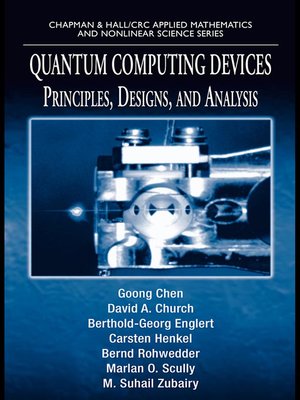
Sign up to save your library
With an OverDrive account, you can save your favorite libraries for at-a-glance information about availability. Find out more about OverDrive accounts.
Find this title in Libby, the library reading app by OverDrive.



Search for a digital library with this title
Title found at these libraries:
| Loading... |
One of the first books to thoroughly examine the subject, Quantum Computing Devices: Principles, Designs, and Analysis covers the essential components in the design of a "real" quantum computer. It explores contemporary and important aspects of quantum computation, particularly focusing on the role of quantum electronic devices as quantum gates. Largely self-contained and written in a tutorial style, this reference presents the analysis, design, and modeling of the major types of quantum computing devices: ion traps, cavity quantum electrodynamics (QED), linear optics, quantum dots, nuclear magnetic resonance (NMR), superconducting quantum interference devices (SQUID), and neutral atom traps. It begins by explaining the fundamentals and algorithms of quantum computing, followed by the operations and formalisms of quantum systems. For each electronic device, the subsequent chapters discuss physical properties, the setup of qubits, control actions that produce the quantum gates that are universal for quantum computing, relevant measurements, and decoherence properties of the systems. The book also includes tables, diagrams, and figures that illustrate various data, uses, and designs of quantum computing. As nanoelectronics will inevitably replace microelectronics, the development of quantum information science and quantum computing technology is imperative to the future of information science and technology. Quantum Computing Devices: Principles, Designs, and Analysis helps fulfill this need by providing a comprehensive collection of the most promising devices for the future.






